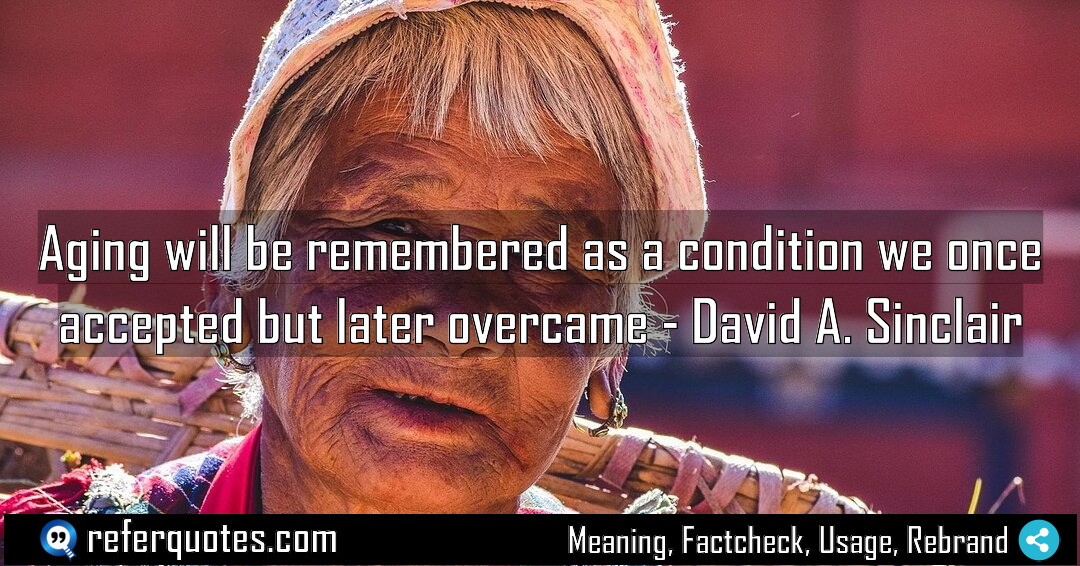
Aging will be remembered as a condition we once accepted… but what if it’s not inevitable? David Sinclair reframes aging from a fact of life into a solvable problem, a perspective shift with massive implications.
Share Image Quote:
Table of Contents
Meaning
This quote is a radical reframing of aging. It’s not about living a little longer; it’s about reclassifying the entire process from an unavoidable destiny to a treatable medical condition.
Explanation
Okay, so let’s break this down. Think about infectious diseases. For most of human history, we just accepted that people died from infections. It was a fact of life. Then we discovered germ theory and antibiotics. Now, dying from a bacterial infection is seen as a tragic failure of medicine, not an inevitability.
Sinclair is saying we’re on the cusp of that same kind of paradigm shift with aging. He argues that aging isn’t just the slow wearing out of our bodies, but a process driven by specific biological mechanisms—what he calls the “Information Theory of Aging.” And if it’s a process with a cause, it’s a process we can potentially intervene in, slow down, or even reverse.
The profound part is the “will be remembered.” He’s not just hoping; he’s stating it as a future historical fact. Our grandchildren will look back at our era and be baffled that we just accepted cancer, Alzheimer’s, and heart disease as a natural part of growing old. To them, it’ll seem as primitive as us thinking diseases were caused by bad air.
Quote Summary
Reading Level78
Aesthetic Score88
Origin & Factcheck
This line comes straight from David A. Sinclair’s 2019 book, Lifespan: Why We Age—and Why We Don’t Have To. It’s a cornerstone of his public messaging. You sometimes see similar sentiments attributed to futurist Ray Kurzweil, but this specific, powerful phrasing is unequivocally Sinclair’s.
Attribution Summary
Where is this quotation located?
| Quotation | Aging will be remembered as a condition we once accepted but later overcame |
| Book Details | Publication Year: 2019; ISBN: 978-1501191978; Last edition: 2020; Number of pages: 432. |
| Where is it? | Chapter 8: A Path Forward, Approximate page 322 from 2019 edition |
Context
Within the book, this quote isn’t just a throwaway line. It’s the logical conclusion of his entire argument. He spends chapters laying out the science of epigenetics and sirtuins, arguing we have the tools—today—to start hacking the aging code. This statement is the bold, summarizing thesis that all that science points toward.
Usage Examples
This is a powerful quote to use when you want to shift someone’s entire perspective. Here’s who you can use it with:
- For a skeptical friend in healthcare: “I know it sounds like sci-fi, but so did handwashing before Semmelweis. Sinclair’s point is that ‘Aging will be remembered as a condition…’—we’re at the very beginning of that curve, and the science is real.”
- In a presentation on innovation: “True disruption isn’t just a better product; it’s a new paradigm. It’s the shift from accepting a reality to solving it. As one leading scientist puts it, ‘Aging will be remembered as a condition we once accepted…’ That’s the level of mindset change we’re talking about.”
- For a colleague in biotech or investing: “We’re not just looking at incremental healthspan gains. We’re looking at the potential to redefine a fundamental human experience. This is the core thesis—that this will be seen as a curable condition.”
To whom it appeals?
Share This Quote Image & Motivate
Motivation Score90
Popularity Score86
Shareability Score90
FAQ
Question: Is this just about living forever?
Answer: Not at all. That’s a common misconception. The primary goal is what’s called “healthspan”—extending the number of years we live in good health, free from chronic disease. The focus is on quality of life, not just quantity.
Question: But isn’t aging natural?
Answer: So is smallpox. “Natural” doesn’t mean “good” or “unalterable.” Cancer is natural. The entire point of medicine is to intervene in natural processes that cause suffering.
Question: Is any of this actually possible with today’s science?
Answer: The research is moving incredibly fast. We’re already extending healthspan in lab animals through genetic and pharmaceutical interventions. Human trials are underway for various aging-related biomarkers. It’s no longer a question of “if” but “when.”
Question: What are the ethical implications?
Answer: Huge ones, and Sinclair discusses them. This would force a complete restructuring of society—retirement, careers, resources. It’s a conversation we need to start having now, not after the science is perfected.
Similar Quotes
We don’t have to accept aging as inevitable. It’s a radical shift from thinking we’re just passengers on the aging train to realizing we might be the engineers. This quote…
You know, when David Sinclair says “Aging is humanity’s most universal experience,” he’s really hitting on something profound. It’s the one journey we all share, and he frames it not…
You know, “Aging research is really about hope” is such a powerful reframe. It shifts the entire conversation from fighting decline to actively building a better quality of life. It’s…
To cure aging, we must first believe it’s possible… and that belief is the very first domino that needs to fall. It’s not just a feel-good statement; it’s the foundational…
To slow aging, we must first change our minds. It’s a profound shift from seeing aging as an inevitable decline to viewing it as a malleable process we can influence.…
